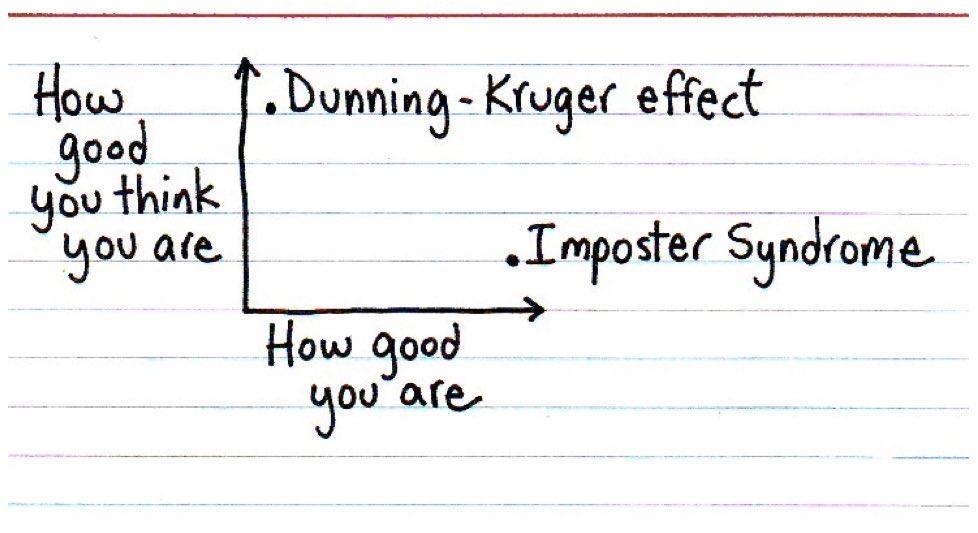Imposter Syndrome is believing that you are not intelligent or capable despite evidence of high achievement. There is a feeling of phoniness and a fear of being found out or exposed as a fraud.
Sound familiar?
Here are 12 tips for working through your Imposter Syndrome:
Sound familiar?
Here are 12 tips for working through your Imposter Syndrome:
Most people with competence have some Imposter Syndrome, because they know how much they don’t know. It& #39;s the opposite of the Dunning-Kruger effect.
(image by @jessicahagy)
Putting private thoughts into words changes how those thoughts exist in our mind and changes our relationship to those thoughts.
Talk to your therapist, loved ones, and trusted colleagues about your worries and let them reflect a different reality to you.
Imposter Syndrome presents itself differently in each of us. Examine your own particular breed of it - when do you feel it most (when you’re praised, with your male boss, when speaking publicly, etc.)?
This will help you build shock absorbers around it.
Don’t compare your behind-the- scenes to everyone else’s highlight reel (in other words, people’s social medias are not reflective of their true struggles).
Allow your accomplishments to stand on their own.
“I should be better, I should be more successful, I should be as smart as so and so...” Doing this puts you into a fixed mindset instead of a growth mindset.
“Forgive yourself for not knowing what you didn’t know before you learned it.”
We tend to ruminate on negative feedback and push positive feedback aside.
Hold onto the nice things people say about you. When you’re feeling like an imposter, look through it to remind yourself that you have made a difference in people’s lives.
Not knowing everything is not the same as being an imposter. Neither is making mistakes or being wrong. Rather than pretending to know something you don’t, own it. Then learn it.
The fastest way to get over feeling like a fraud is to genuinely help someone else. Being helpful and caring combats Imposter Syndrome because it refocuses your attention on being loving toward others instead of critical of yourself.
When someone pays us a compliment we usually reply with why they’re wrong. Or, we throw a compliment right back.
A compliment is a gift, and should be accepted properly before moving on. https://twitter.com/dremilyanhalt/status/1282360292433788928">https://twitter.com/dremilyan...
“That iteration was inadequate” is not the same as “you are inadequate.”
Our work is our life in so many ways. But the two overlap, they are not one and the same. Find a sense of agency and joy outside of your work and invest in it.
By thinking you’re fooling everyone around you, you’re assuming that people are easily fooled.
Is it really more likely that you’re bad at what you do but good at tricking people, than it is that you were hired for good reason?
(The answer is no)
The things we tell ourselves become our reality. Sometimes, we have to say to ourself: I am good, I am worthy, I am valuable - even when we don’t feel it. Over time, it will get harder to deny, and easier to believe.
You got this!

 Read on Twitter
Read on Twitter Remember that you’re in good company. Most people with competence have some Imposter Syndrome, because they know how much they don’t know. It& #39;s the opposite of the Dunning-Kruger effect.(image by @jessicahagy)" title="https://abs.twimg.com/emoji/v2/... draggable="false" alt="🤔" title="Denkendes Gesicht" aria-label="Emoji: Denkendes Gesicht"> Remember that you’re in good company. Most people with competence have some Imposter Syndrome, because they know how much they don’t know. It& #39;s the opposite of the Dunning-Kruger effect.(image by @jessicahagy)" class="img-responsive" style="max-width:100%;"/>
Remember that you’re in good company. Most people with competence have some Imposter Syndrome, because they know how much they don’t know. It& #39;s the opposite of the Dunning-Kruger effect.(image by @jessicahagy)" title="https://abs.twimg.com/emoji/v2/... draggable="false" alt="🤔" title="Denkendes Gesicht" aria-label="Emoji: Denkendes Gesicht"> Remember that you’re in good company. Most people with competence have some Imposter Syndrome, because they know how much they don’t know. It& #39;s the opposite of the Dunning-Kruger effect.(image by @jessicahagy)" class="img-responsive" style="max-width:100%;"/>


